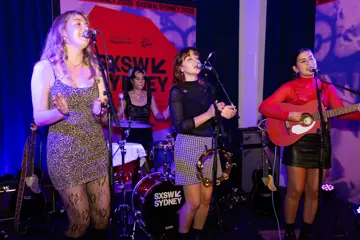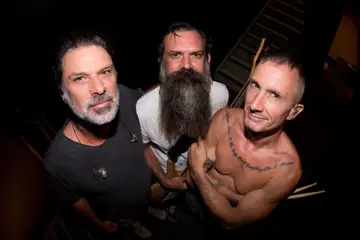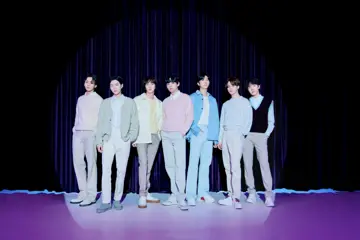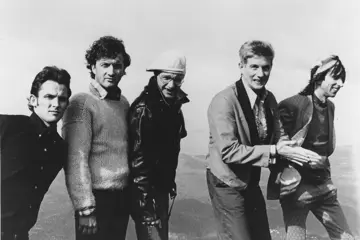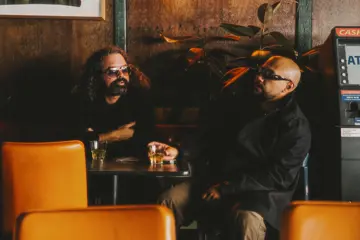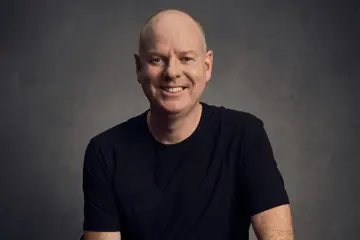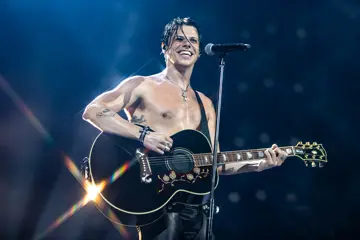the magnificent seven

It’s the revisionist-Western remake for the inclusivity era. In the new-millennial The Magnificent Seven, the band of merry vigilantes rescuing a frontier town from a marauding militia of thieves are lead by Denzel Washington, and their ranks include a Mexican (Manuel Garcia-Rulfo), a Comanche (Martin Sensmeier), a “mysterious man of the Orient” (Byung-hun Lee), and something resembling a proto-bear (Vincent D’Onofrio). Hell, there’s even a woman (Haley Bennett) who knows her way around a gun. They’re a gang of unlikely allies, rounded out by a smart-ass grifter (Chris Pratt, doing his Chris Pratt thing) and a Creole sharpshooter with the shakes (Ethan Hawke).
For all the Western clichés at work —riding in front of scenic ranges, fingers twitching over six-shooters, high-street stand-offs, a stranger silencing a roughneck saloon, a roustabout punched off a bar-room balcony who falls down and breaks a table, a shooting-range target peppered with improbable accuracy— there’s shades of both the getting-the-gang-together heist movie and the rag-tag-underdogs sports-movie. With our magnificent men training up a whole town to learn to shoot, the down-and-outers are banding together to slay evil baron Peter Sarsgard —a smarmy prick in brocade vest with little regard for human— and his many faceless minions; an unlikely army of righteous insurgents.
The unlikeliness of this central, titular union is symbolised by their collective backgrounds, their gathered melting-pot a work of post-racial fantasy. Whilst there’s evocations of Civil War in the recent past, there’s no mention of the fact that the film is set at the end of Reconstruction; that, 15 years beforehand, a black man, like Denzel, was viewed by half the country not as a person, but property. Aside from some moments of effectively-good-natured ribbing from Pratt to Garcia-Rulfo, no one exhibits any real racism; there an antiseptic quality to the way that the ugly past is tailored to suit the values of the present.
Antoine Fuqua’s film is, in many ways, a corrective against past Westerns: here, the cowboy dressed in all black also happens to be black. When Denzel first rides into frame, locals are terrified; but the simple mores of black-hat villainy are soon inverted, this man-in-black revealed as avenging angel. This simple message —fear not a black man walking down the street— is, obviously, politically loaded at this point of American history.
Don't miss a beat with our FREE daily newsletter
But if anyone comes to The Magnificent Seven expecting a work of true defiance and dissidence, they’re in the wrong cinema. For all its racial progressiveness, there’s a regressive lust for the brutality and murderousness of yore; or, moreso, The Magnificent Seven still feels like movie-biz business-as-usual. Here, every conversation comes from either side of a barrel, every problem is solved by a firearm; the film feeling like a masturbation aid —see the men stroking their phallic-symbol shooters— for Second Amendment evangelists. This is written in the genre, sure: Westerns forever populated by the quick and the dead. But if the cinematic past is to be rewritten, maybe next time could we do it without the fetishisation of firearms, and heroism equating to bouts of brutal murder?
equity

When we first see Anna Gunn’s investment-banking bank-roller enter her workplace, she waits at the lift, one woman in a sea of suited dudes. Equity’s lead is a familiar Wall St. character: an early speech, on a panel of female university alumni, is this film’s own
‘Greed is good’ moment; Gunn professing her lust for money, the power it brings, and the right for a woman to display such naked financial ambition.
Gunn is fastidious, ruthless, a little cruel; there’s no sorority between her and mentee Sarah Megan Thomas, a VP who is overworked, underpaid, kept in her place. When things get sexy with her broker love-interest, James Purefoy, hot talk involves old passwords from the ’90s. But, she’s also filled with self-doubts, and doubts about those doubts: “men don’t do this, right?” Gunn asks, when insecurity sets in; a failed IPO float turning her into a spooked prizefighter, hands shaking, killer instinct wobbling. The coalface of hyper-capitalism —the trading floor, here, described as “pure American desire”— is no place for the faint-hearted; the film ultimately, wryly, showing how the system is completely corrupt, essentially unimpeachable, a jenga tower looming as obvious symbol.
Equity is a film about women —Gunn, Thomas, Alysia Reiner’s legal investigator— out to make it in a man’s world, in both its story and in its place in the movie-biz. Thomas and Reiner also serve a its producers, and both its screenwriter (Amy Fox) and director (Meera Menon) are women. It’s, openly, a female spin on the financial-thriller, something rarely (never?) seen, and, thus, something that casts fresh light on a tired genre. But, beyond that, Equity is essentially mediocre cinema: competently mounted, dutifully plotted, well acted, but with little flash or verve; it never creating the requisite tension for its thriller machinations to truly take hold.
i am not a serial killer

The title of I Am Not A Serial Killer isn’t a cry of virtue —like The Wrong Man or I Just Didn’t Do It— but, instead, something that its lead character isn’t sure of. An all-grown-up Max Records (the kid from Where The Wild Things Are) plays a small-town teen who’s been raised in a family home that doubles as a funeral home; the embalming room just downstairs, death a daily business seen on a daily basis. Records isn’t just fascinated with death, though. He harbours teenaged-boy obsessions with the occult, the fantastic, and famous murderers. Meaning, he’s starting to tilt from adolescent dissident to budding sociopath; and, as his therapist (Karl Geary) tells his mother (Laura Fraser), he has all the hallmarks of a future serial killer.
When a host of dead bodies starts turning up in his small-town America, Records becomes obsessed with the killings; though, there are kids at school and local gossips who wonder if his obsession signifies something more nefarious. When the local cops are slaughtered, Records has to function as a sort of Encyclopaedia Brown of the supernatural, with the killings starting to seem less serial-killer-ish, more the work of a fantastic beast.
With Christopher Lloyd delivering a terrifying turn as the elderly next-door neighbour who’s a little too watchful over our young anti-hero, director Billy O’Brien maintains a balance between shaggy domestic comedy and straight-up horror-film tropes. But, by the time I Am Not A Serial Killer turns full B-movie in the third act and everyone ends up getting killed, it feels anticlimactic; a wry exploration of slippery psychological states (and/or: adolescence) becoming a straight-up slasher.
under the shadow

Under The Shadow is a horror-movie that passes a simple horror-movie test: it features a character sticking around a haunted house long beyond reason, to the point of exasperation. It’s set in the dying days of the Iran-Iraq war, in a Tehran apartment, where a young mother, Narges Rashidi, refuses to leave despite the fact that the city is being abandoned, Iraq is dropping bombs, an unexploded ordinance punctures the apartment-building’s roof, cracks appear in the ceiling, the whole thing seems about to topple, and, oh, yes, a malevolent spirit seems to be stalking her, and her daughter (Avin Manshadi) has possibly been possessed. It’s a genre movie, for sure, with shades of early Polanski and The Babadook.
But, Babak Anvari’s debut is also, clearly, a political picture. Its malevolent spirit may be a djinn, but, really, what’s haunting its central character is the spectre of the new Islamic regime. At one point, the djinn itself is animated as a giant chador, ready to smother Rashidi in a cloak of patriarchal darkness. She’s a doctor who, after having put her career on hold to raise her daughter, wants to return to work; only for a condescending bureaucrat to tell her she’ll never have a career again due to her youthful activism. Her husband —a doctor who was once her peer— has taken on the new conservatism, sure her role, these days, is looking after their daughter.
Even when Rashidi finally does what frustrated viewers have been waiting for and attempts to flee the apartment, she runs out into the streets with her hair uncovered, and is duly arrested by the police. In one instant of terror, her morals are judged, her freedom lost; and, her crime is punishable by lashes. When she, then, returns to her house and bunkers down, Under The Shadow has made its point: the fear driving its scares comes not from its supernatural spectre, but from the society that lingers outside. Here, Anvari makes the horrors of genre, the horrors of war, and the horrors of oppression one singular terror.
wednesday, may 9

In Vahid Jalilvand’s debut feature, the titular date has been chosen by a teacher (Amir Aghaei) as a date of grand public philanthropy: he will give over 30 million tomans to a person in need. On that morning, a massive, braying crowd gathers outside the gates of an office building, but it’s less Willy Wonka, more Salaam Cinema. Jalilvand taps into a long history of Iranian social-realism, looking at a society filled with the poor and unfortunate, in which money is a currency needed to turn bureaucratic wheels.
Wednesday, May 9 mounts a triptych of connected stories, from Aghaei’s weary, grief-stricken, would-be good-do-er —who soon realises aiding people in need burdens you with their problems— to a woman (Niki Karimi) hoping for money so that her wheelchair-bound husband can have a life-saving operation, to a newlywed (Sahar Ahmadpour) whose family is demanding ‘blood money’ from the husband (Milad Yazdani) they never approved of. Even if Jalilvand’s script lacks the elegance of modern Iranian master Asghar Farhadi, his film shares the same moral crises, class conflicts, monetary demands, and undertow of deep grief. It’s a dark drama full of suffering, but shot through with humanity.
antonia

The Italian Film Festival is currently playing around the country, and whilst it’s lacking in both auteurs (save Marco Bellocchio, who skips through merrily time with the son-haunted-by-his-mother melodrama Sweet Dreams) and true highlights, Ferdinando Cito Filomarino’s Antonia will please those who lament the normally dull, pat realm of the artist biopic. It’s a portrait of the short life of Italian poet Antonia Pozzi that’s duly poetic; Filomarino eschewing overdetermined drama for stilled scenes of quiet observation. There’s simple instances in which Pozzi (played by Linda Caridi) eats breakfast, takes tea, writes in her journal, or, best of all, goes rock-climbing. The film looks resplendent: it’s shot on celluloid, lensed by Apichatpong Weerasethakul’s DP Sayombhu Mukdeeprom, and outfitted by Fendi. There’s no spelt-out dramatic arcs, cod-psychologising, or mythicising the self-destructive artist. But there is the wisp of mist through mountains, trees blowing in the wind, ink soaking into pages, and so many great outfits.
francofonia

Whilst it’s certainly not his best film, Russian Ark is Alexander Sokurov’s most famous one, and by far his most successful. And so his latest, Francofonia, has found a rare local release based on its thematic proximity. It’s another film given insider access to a rarefied collection —this time, the Louvre— that sees museums as both repository of history and indivisible from history itself. But, where Russian Ark found fame for being shot in a single take, Francofonia is far more scattershot, impressionistic.
Sokurov has spent his long, mercurial career moving freely between fiction and non-fiction, and Francofonia effectively splits the difference. It’s filled with newsreel footage from the fin de siècle and occupied France, real faces —from people on the street to Napoleon III and Chekhov— peering out at us from distant days. Sokurov matches this with a newly-shot dramatisation of history presented with mock-vintage effects: the film’s ‘story’, as it were, concerns the relationship between the museum’s director (Louis-Do de Lencquesaing) German officer (Benjamin Utzerath) tasked with preserving precious artworks in newly-acquired territories.
But there’s also a framing narrative where Sokurov Skypes with a ship captain whose cargo is precious artworks, and is battling rough seas, en route to meet the filmmaker. And there’s endless meditations and asides, the whole amounting to a fluid essay movie, in which the past comes alive in the present; history not just to be preserved, but played with.
life, animated

Roger Ross Williams’ documentary Life, Animated isn’t your regular Disney movie, but it’s so much of a Disney movie that it’s an ad for Disney movies: watch how the magic of the Magical Kingdom helps an autistic boy out of his shell! As a child, Owen Suskind seemed distant, unreachable to his parents and older brother (whose name is actually Walt!). He was obsessed with animation, though, and when his parents realised his endless mumblings-to-self were lines from Disney movies, they saw a way for his love of films to foster skills in communication and emotional recognition. Now grown up, Owen talks like a cartoon character brought to life: his vocal register bright, colourful, wildly pitched. With footage of all your favourite cartoons spliced throughout, it’s a story big on heart-warming sentimentality.
But, gladly, Life, Animated moves beyond this simple set-up, eventually managing to shake off the feeling that you’re watching Sponsored Content. After telling the Inspirational tale of Owen, Williams then keeps the camera on him, the film’s central subject having to learn what happens beyond Happily Ever After. He grapples with moving out on his own, with having a romantic relationship, and with sexual desire: things no Disney movie can teach him. Rather than keep the sense of aw-shucks optimism going, Life, Animated shows the daily difficulties that await an autistic adult. For all the Disney-ism at play, Williams’ refusal to sugarcoat these harsh truths finally separates the film from that cinematic realm; its final stretches suggesting anything but happiness after its end.

